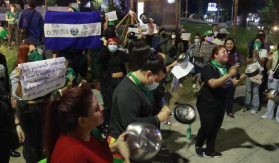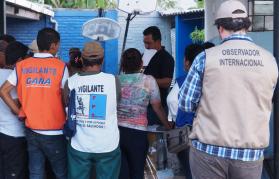Report on CISPES Delegation visit to the ILEA
Introduction
On May 3, 2007 a group of eight people representing theCommittee in Solidarity with the People of ElSalvador (CISPES) toured thefacilities of the U.S.-sponsored International LawEnforcementAcademy (ILEA)in Santa Tecla, a suburb of SanSalvador. Thegroup was part of a larger 16-person delegation that spent ten days travelingaround ElSalvador meeting with political and social movementleaders, government officials, and experts on the current socio-politicalsituation in El Salvador.
The visit to the ILEA by CISPES was one of the firstinternational tours granted to an outside civil organization, and therefore waskey in raising questions and gathering information about this nascentinstitution
[1]
. The CISPES representatives met with threeILEA officials (one of whom was Salvadoran and the other two U.S.
citizens)and one official from the US Embassy. During their nearly two hour visit they alsohad the opportunity to visit ILEA classrooms.
Note: Congress willvote on appropriations to the ElSalvador ILEA as part of the fiscal year2008 Foreign Operations bill.
Statements about theConduct of the Salvadoran National Police (PNC)
One of the most alarming things heard was the denial by ILEAand U.S. Embassy officials of the repression carried out by the SalvadoranNational Police (PNC), not to mention other cases of misconduct and corruptionby the PNC. The U.S. officialsseemed oblivious to repeated reports and articles about human rights violationscommitted by the PNC, such as a report published on the day of the CISPESmeeting by Tutela Legal, the humanrights and legal aid office of the Salvadoran Archbishop. The report cites eight cases in which membersof the PNC appear to have been involved in death-squad type assassinations in2006 alone
[2]
. The officials even went as far as to say thatEl Salvador was selected asthe host country for the ILEA in Latin Americabecause of the PNCs apparent professionalism and its lack of documentedcorruption.
The ILEA and U.S.Embassy officials also showed acomplete disdain for the Salvadoran Human Rights Defense Office (PDDH), aninstitution created under the 1992 Peace Accords to oversee the human rightssituation in El Salvador, and forits director Beatrice de Carrillo, who has visited the U.S. Congress onnumerous occasions to report on the situation in her country. They denied detailed reports by the PDDHciting connections between the PNC and right-wing death squads, and dismissed DeCarrillo as an illegitimate source of information saying that there was noevidence namely dead bodies to support her claims about death-squadsoperating within the PNC.
In fact, De Carrillo and the Human Rights Office have doneexhaustive investigations into the conduct of the PNC and have publishedimportant reports cited by the Salvadoran and international press. Last Junes report Situation of Human Rightsin El Salvadorincluded a section documenting how the local Sonsonate branch of the PNC wasresponsible for the extrajudicial execution of three alleged gang members.
[3]
In CISPESs meeting with De Carrillo she denounced the governments lackof political will to investigate this and other cases, such as the murder ofthe two elderly parents of a well-known opposition figure. If the U.S. government refuses to head thereports of the governments own Human Rights Defense Office, not to mention arespected organization like Tutela Legallinked to the Archbishops office, they are setting a dangerous precedentwhereby only the PNC and the Salvadoran government can be trusted to makestatements about their own conduct.
Meanwhile, the officials did say that if the PNC is corruptand repressive, then everything carried out by the ILEA is tainted. Such statements would presuppose that moreserious research would have been put into the conduct of the PNC and the veryrecent history of police repression and corruption in El Salvador. Although the ILEA is an international policeand law enforcement training center, with students from many countriesthroughout Latin America, ILEA officials reported that 25% of the spaces at theacademy are reserved for Salvadorans. Thisspecial relationship between the ILEA and the Salvadoran PNC heightens concernsabout U.S.officials dismissal of evidence showing the PNC to be connected to repressionand serious human rights abuses.
The Role of the ILEAin El Salvador
The US-funded ILEAconducts classes for students from throughout LatinAmerica. When asked why itwas so important for the U.S.to be part of training Latin American law enforcement officials, the ILEA directors responded that U.S. presence contributed to networkingpossibilities and added an international flavor to the training alreadybeing conducted in El Salvador. 95% of the instructors are from U.S. federalagencies, many of whom receive diplomatic immunity. According to the U.S. officials, the ILEA is not currently training military officials butcould be open to the possibility of training military police forces in thefuture. Though they were defensivelyinsistent in their position that the ILEAis not another School of the Americas (now called WHINSEC,the Western Hemispheric Institute for Security Cooperation), they also assertedthat there is no need to train military personal at the ILEA since that is what they use WHINSEC in Georgia for, an apparent contradiction.
The U.S. Bureau of Democracy, Human Rights and Labor ischarged with completing background checks on students and the police units theycome from. In terms of the selection ofILEA students, the so-called LeahyLaw (normally used to screen for human rights abuses within foreign military unitsreceiving training from the U.S.)is supposedly applied as part of vetting process in which the INL will rejectstudents on the basis of moral turpitude, human rights violations, and criminalhistory. However, the U.S. officialslack of knowledge about documented violations by the Salvadoran PNC raisesconcerns about whether the INL is in fact doing sufficient checks into the backgroundsof police units.
When the CISPESdelegation asked the Human Rights Ombudswoman about the ILEA, she asserted that it only has the potential ofmaking the PNC more "professional and elegant in its use of violence,"and that she had no expectation of the ILEAimproving the integrity of the PNC. Outsidepolice training is simply not needed, she said; what is needed is a completeoverhaul of the PNC, once a promising post-war civilian police force that hasbecome increasingly corrupt and politicized over the last ten years. She also referred to the existing SalvadoranNational Police Academy, and asserted that rather than introducing a new policetraining facility the Salvadoran government should work to reform the NationalAcademy, an institutional accountable to the National Assembly.
CISPES is troubled by the way in which the PNC has beenmanipulated by the current government to carry out targeted politicalrepression; meanwhile, the Salvadoran government has refused to investigatespecific human rights violations within the PNC or clean-up what is consideredto be a damaged institution.
Finally, The officials were also were careful to point outthat the ILEA is not concerned with crimeprevention by way of tackling the social roots of violence, which, they said,are not within their jurisdiction.
Transparency
One issue that has already been addressed by otherorganizations is the lack of transparency within the ILEA
[4]
. Though ILEA officials claimed that theinstitution is entirely transparent, their repeated refusal to provide names ofstudents and instructors, as well as the curriculum and class syllabi to civilorganizations in the U.S.and El Salvador,seems highly contradictory. When they refused to provide the CISPESdelegation with this information, they referred to the course list published ontheir website.
[5]
However, the site only shows the names of theclasses being taught. The delegation askedthem to provide a list of course descriptions, and they claimed to not have anywritten, short descriptions of what is taught in the classes. It seems unlikely that the police forces of variousLatin American countries would send their police to a school that does notdescribe what they will be teaching.
Conclusions
While the lack of transparency at the ILEA is significant, the most disturbing aspect of theCISPES visit to the academy was therefusal of U.S.officials to acknowledge the problems human rights violations, corruption, and linksto death squads related to the Salvadoran National Civilian Police. Given that by their own account the integrityof the PNC is essential to the integrity of the ILEA,CISPES will continue to expose anddenounce the documented cases of PNC political repression and human rightsabuses.
Ultimately, the CISPES visit to the ILEA raised seriousconcerns, especially given the U.S.officials' explicit backing of a repressive police force such as the PNC. In fact, 56 Congressional Representativessigned a Dear Colleague record last year calling on the State Department toinvestigate and monitor the misconduct of the PNC
[6]
. Clearly the current Administration has chosennot to head that call.
CISPES asserts that the presence of the International LawEnforcement Academyin El Salvador serves as anopen endorsement by the U.S.government of the worsening police practices in El Salvador; and CISPES is firm inits position that the ILEA must be closed.
May 2007
[1]
The agreement between the US andSalvadoran governments to open the ILEAwas announced in July 2005 approved by the Salvadoran Legislature in Novemberof that year. More backgroundinformation at www.cispes.org/ilea.
[2]
PNC involucrada en 8 asesinatos, DiarioColatino, May 3, 2007. http://www.diariocolatino.com/nacionales/detalles.asp?NewsID=16483
[3]
Situación de los Derechos Humanos en ElSalvador. June 2006Report by the Salvadoran Human Rights Office. www.pddh.gob.sv/modules.php?name=Downloads&d_op=getit&lid=73.
[4]
Visit to InternationalLaw Enforcement Academyin San Salvador,by Lisa Sullivan, SOA Watch. http://cispes.org/index.php?option=com_content&task=view&id=193&Itemid=29
[5]
ILEASan SalvadorProposed Training Schedule 2007. http://www.fletc.gov/about-fletc/locations/international-law-enforcement-academies-ileas/ilea-san-salvador/ilea-san-salvador-2007-proposed-training-schedule.html
[6]
Congressional Dear Colleague letterregarding violence in El Salvador,July 31, 2006. Posted on CISPES webpage at http://cispes.org/index.php?option=com_content&task=view&id=74&Itemid=29



